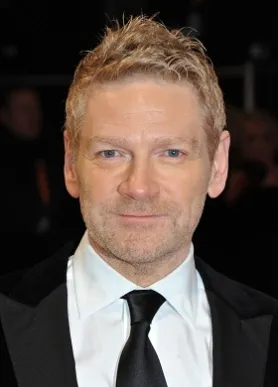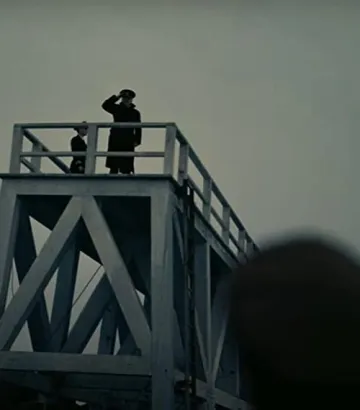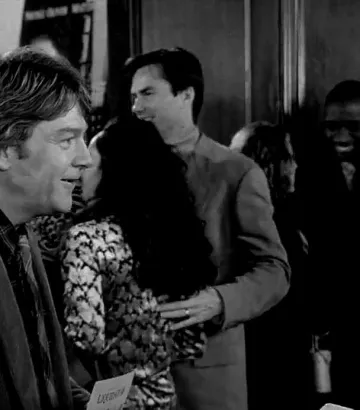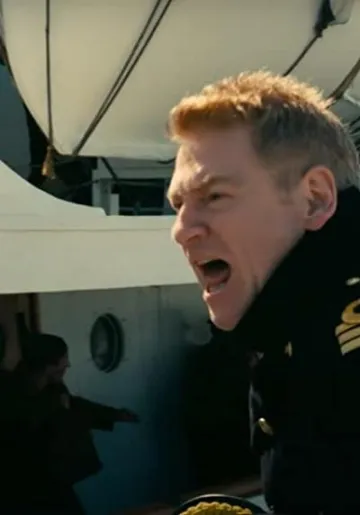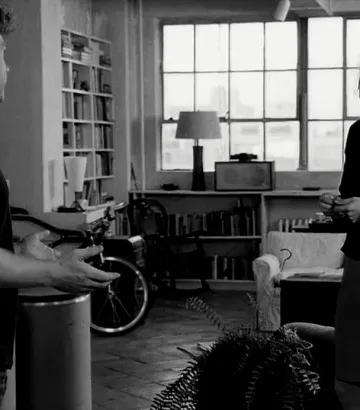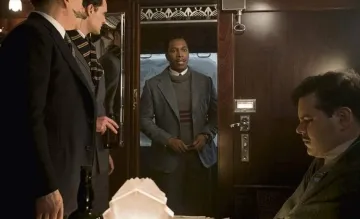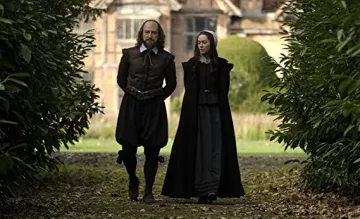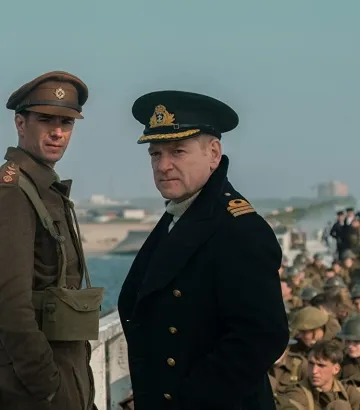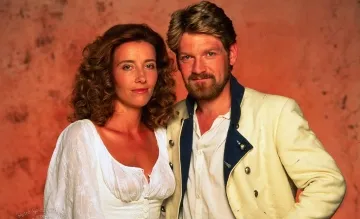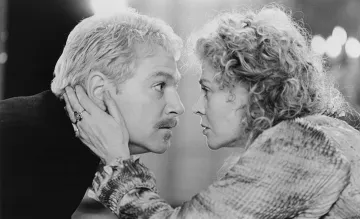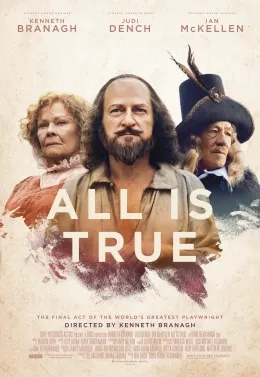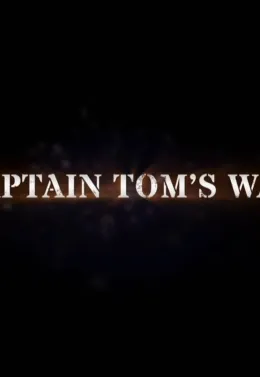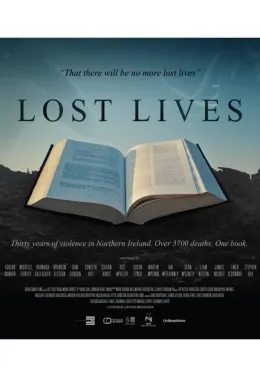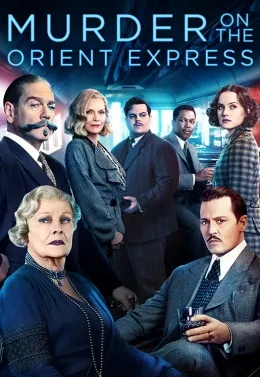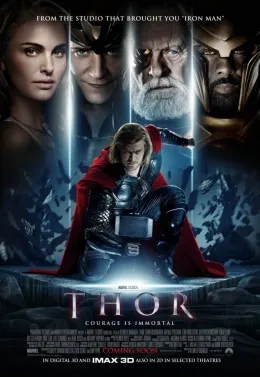Kenneth Branagh
Biography
Kenneth Charles Branagh was born on December 10, 1960, in Belfast, Northern Ireland, to parents William Branagh, a plumber and carpenter, and Frances (Harper), both born in 1930. He has two siblings, William Branagh, Jr. (born 1955) and Joyce Branagh (born 1970). When he was nine, his family escaped The Troubles by moving to Reading, Berkshire, England. At 23, Branagh joined the Royal Shakespeare Company, where he took on starring roles in "Henry V" and "Romeo and Juliet". He soon found the RSC too large and impersonal and formed his own, the Renaissance Theatre Company, which now counts Prince Charles as one of its royal patrons. At 29, he directed Henry V (1989), where he also co-starred with his then-wife, Emma Thompson. The film brought him Best Actor and Best Director Oscar nominations. In 1993, he brought Shakespeare to mainstream audiences again with his hit adaptation of Much Ado About Nothing (1993), which featured an all-star cast that included, among others, Denzel Washington, Michael Keaton and Keanu Reeves. At 30, he published his autobiography and, at 34, he directed and starred as "Victor Frankenstein" in the big-budget adaptation of Mary Shelley's novel, Mary Shelley's Frankenstein (1994), with Robert De Niro as the monster himself. In 1996, Branagh wrote, directed and starred in a lavish adaptation of Hamlet (1996). His superb film acting work also includes a wide range of roles such as in Celebrity (1998), Wild Wild West (1999), The Road to El Dorado (2000), Valkyrie (2008) and his stunning portrayal of Laurence Olivier in My Week with Marilyn (2011), where once again he offered a great performance that was also nominated for an Academy Award.
Spouse
- Lindsay Brunnock (24 May 2003 - present)
- Emma Thompson (20 August 1989 - 1 October 1995) ( divorced)
Trade Mark
- Likes to use very long takes (3-4 minutes) at certain points during his films.
- Frequently casts Richard Briers, Brian Blessed, Jimmy Yuill, Derek Jacobi and himself.
- Frequently gives small roles to Patrick Doyle, his composer.
- Frequently works with Director of Photography Roger Lanser, with whom he has made eight films.
- Frequently works with director Christopher Nolan.
Trivia
- Originally cast as the lead in Amadeus (1984) before the production company decided on casting American actors in the leading roles.
- Educated at the Royal Academy of Dramatic Art (RADA), London.
- Grew up in poverty in the shadow of a tobacco factory in Belfast.
- At age 23, he became the youngest actor in the Royal Shakespeare Company to ever play the lead in Shakespeare's "Henry V".
- Co-founded the Renaissance Theatre Company with David Parfitt, with Prince Charles as a royal patron.
- Youngest actor to receive the Golden Quill (Gielgud Award), 2000.
- He allegedly declined the C.B.E. (Commander of the order of the British Empire) in 1994.
- He was awarded the Laurence Olivier Theatre Award in 1983 (1982 season) for Most Promising Newcomer for his performance in "Another Country".
- Was one of the directors considered for Harry Potter and the Prisoner of Azkaban (2004). He had appeared in the previous film, Harry Potter and the Chamber of Secrets (2002).
- He was nominated for a 2004 Laurence Olivier Theatre Award for Best Actor of 2003 for his performance in "Edmond" at the Royal National Theatre: Olivier Stage.
- He was awarded the 1988 London Critics Circle Theatre Award (Drama Theatre Award) for Special Award.
- He was nominated for a 2004 London Evening Standard Theatre Award for Best Actor for his performance in "Edmond" at the Royal National Theatre.
- Claims that Derek Jacobi is the reason he got into acting, and thus Jacobi became a frequent collaborator with him in most of his movies.
- Was age 15 when he first saw "Hamlet" performed.
- A Member of the RADA Council.
- Appeared with Campbell Scott in Dead Again (1991). Scott later starred in and co-directed Hamlet (2000), and Branagh later starred in and directed Hamlet (1996).
- Wrote many of the A Midwinter's Tale (1995) characters for specific actors.
- He was one of the guests at Prince Charles's and Camilla Parker-Bowles' wedding on 9 April 2005.
- Is a vice-president of Chichester Cinema at New Park. Maggie Smith and Anita Roddick are also vice-presidents.
- In 1990, he received an honorary doctorate in Literature from Queen's University (located in Belfast, Northern Ireland).
- Former son-in-law of Phyllida Law and Eric Thompson.
- To date (2008), he has appeared as the title character in five films: Henry V (1989), Mary Shelley's Frankenstein (1994), Hamlet (1996), Shackleton (2002), Wallander (2008).
- Was considered for the role of Jack Crawford in The Silence of the Lambs (1991).
- Ex-brother-in-law of Sophie Thompson and Richard Lumsden.
- He can speak Italian.
- He can play guitar, piano and tap.
- He and his ex-wife, Emma Thompson, have appeared in separate films in the Harry Potter series. Branagh played Gilderoy Lockhart in Harry Potter and the Chamber of Secrets (2002), and Thompson played Sybil Trelawney in Harry Potter and the Prisoner of Azkaban (2004). Depending on what has been cut from the script for the fifth film, Harry Potter and the Order of the Phoenix (2007) could be the first time both have appeared together in the same film since their divorce. Also appearing in Harry Potter and the Order of the Phoenix (2007) is his ex-girlfriend, Helena Bonham Carter.
- Shares two film roles with Laurence Olivier: Henry V and Hamlet. He and Olivier also both directed their own performances in both films. He also directed Sleuth (2007), a remake of the 1972 film, in which Olivier starred. This time, Michael Caine played Olivier's part, while Jude Law played the second of two roles he shared with Caine - having previously appeared in Alfie (2004). Kenneth Branagh has also played the title role in a Naxos Audiobook CD of "Richard III', by William Shakespeare, another role that Olivier also played. Branagh portrayed Laurence Olivier in My Week with Marilyn (2011) and was nominated for a Best Supporting Actor Oscar for his performance.
- The last film he made with Emma Thompson was Much Ado About Nothing (1993). Their roles had previously been played in an earlier film by Robert Stephens and Maggie Smith, who were also a couple at the time. Branagh and Thompson appeared together in Fortunes of War (1987) and Henry V (1989), which also featured Stephens, and in the Harry Potter films with Smith.
- Has directed two people who have played Batman: Christian Bale in Henry V (1989), and Michael Keaton in Much Ado About Nothing (1993).
- One of only three actors to have their names mentioned by a character in the Blackadder series, alongside Charles Chaplin (Blackadder Goes Forth (1989), and Delia Smith (Blackadder Back & Forth (1999)). Blackadder mentioned his name in Blackadder Back & Forth (1999) whilst talking to William Shakespeare on the topic of 'Hamlet'.
- Mentioned in the theme song for The Adventures of George the Projectionist (2006).
- Was originally considered for the part of the younger Obi-Wan Kenobi in Star Wars: Episode I - The Phantom Menace (1999).
- Won the 2004 Evening Standard Theatre Award as Best Actor for his performance as the title character in Edmond at the Royal National Theatre.
- Nominated for the 2009 Evening Standard Theatre Award as Best Actor in a play for his role as Ivanov in the play Ivanov at Wyndham's Theatre in London as part of the Donmar West End Season.
- Has directed many other Harry Potter cast members in his own movies. Ex-wife Emma Thompson appeared with him in Henry V (1989), Dead Again (1991), and Much Ado About Nothing (1993). Robbie Coltrane appeared in Henry V (1989). Julie Christie and Timothy Spall appeared in Hamlet (1996). Imelda Staunton appeared in Much Ado About Nothing (1993). John Cleese, Robert Hardy, and Helena Bonham Carter appeared in Mary Shelley's Frankenstein (1994).
- Middle brother of William Branagh Jr. and Joyce Branagh.
- Was considered for the role of Paul Smecker in The Boondock Saints (1999). The role ultimately went to Willem Dafoe.
- Often circles the camera around his actors when they are performing a monologue or having a conversation in one of his Shakespearean films.
- He was awarded the Knight Bachelor of the Order of the British Empire in the 2012 Queen's Birthday Honours List for his services to Drama and to the community in Northern Ireland.
- He has been a fan of "Thor" since childhood. When Marvel Studios selected Branagh as the director of the film adaptation, they sent him the complete collection of the Marvel Thor comics series as reference material for the character.
- His top ten films of all time are: Napoleon (1927), Citizen Kane (1941), Brief Encounter (1945), Black Narcissus (1947), The Third Man (1949), The Searchers (1956), Manhattan (1979), Raging Bull (1980), Tootsie (1982) and Au Revoir les Enfants (1987).
- Was knighted by Queen Elizabeth II on November 9, 2012 at Buckingham Palace.
- Was involved as director for a while in the early stages of production of Dragonheart.
- Berkshire, England: Actor [June 2012]
- Filming scenes for Richard Curtis' Pirate Radio (2009). [March 2008]
- Filming his scenes for Bryan Singer's movie Valkyrie (2008) on location in Germany. [2007]
- Filming Warm Springs (2005) in Georgia and Atlanta, USA, playing Franklin D. Roosevelt. [November 2004]
- Filming his scenes for TV series 10 Days to War (2008) on location in Jordan. [2008]
- Filming and producing the three part Wallander (2008) series for BBC TV, on location in Sweden. The series is based on three of the 'Kurt Wallander' novels by Swedish writer Henning Mankell. The three novels on which the series is based are called: "Sidetracked", "One Step Behind" and "Firewall". [April 2008]
- Release of the book, "Ken & Em: A Biography of Kenneth Branagh and Emma Thompson" by Ian Shuttleworth. [1995]
- He has two roles in common with Laurence Olivier, whom he played in My Week with Marilyn (2011): (1) Olivier played King Henry V in Henry V (1944) while Branagh played him in Henry V (1989) and (2) Olivier played the title character in Hamlet (1948) while Branagh played him in Hamlet (1996). In each case, Olivier and Branagh directed the relevant film.
- He has directed Jimmy Yuill in seven films: Henry V (1989), Much Ado About Nothing (1993), Mary Shelley's Frankenstein (1994), Hamlet (1996), Love's Labour's Lost (2000), The Magic Flute (2006) and As You Like It (2006).
- He directed Richard Briers in nine films: Henry V (1989), Peter's Friends (1992), Swan Song (1992), Much Ado About Nothing (1993), Mary Shelley's Frankenstein (1994), A Midwinter's Tale (1995), Hamlet (1996), Love's Labour's Lost (2000) and As You Like It (2006).
- He has directed Derek Jacobi in five films: Henry V (1989), Dead Again (1991), Hamlet (1996), Cinderella (2015) and Murder on the Orient Express (2017).
- He directed his then wife Emma Thompson in four films: Henry V (1989), Dead Again (1991), Peter's Friends (1992) and Much Ado About Nothing (1993).
- He has directed Brian Blessed in four films: Henry V (1989), Much Ado About Nothing (1993), Hamlet (1996) and As You Like It (2006).
- He received an Academy Award nomination for Best Supporting Actor for his role as Laurence Olivier in My Week with Marilyn (2011). Olivier himself was nominated for the award for his role as Dr. Christian Szell in Marathon Man (1976).
- Despite having lived in England for the majority of his life and being associated closely with it, he considers himself more Irish than English.
- He made two films with Robert Sean Leonard in 1993: Swing Kids (1993) and Much Ado About Nothing (1993).
- He has directed Alex Lowe in three films: Peter's Friends (1992), Much Ado About Nothing (1993) and Mary Shelley's Frankenstein (1994).
- Although he played Cherie Lunghi's son in Mary Shelley's Frankenstein (1994), he is only eight years her junior in real life.
- To date, he is the last actor to have received an Academy Award nomination for his role in a Shakespearean film. He was nominated for Best Actor for playing the title character in Henry V (1989), which he also directed.
- He has directed Richard Clifford in five films: Henry V (1989), Much Ado About Nothing (1993), Mary Shelley's Frankenstein (1994), Love's Labour's Lost (2000) and As You Like It (2006).
- Is one of 13 actors who have received an Academy Award nomination for his portrayal of a real-life king. The others in chronological order are Charles Laughton for The Private Life of Henry VIII. (1933), Robert Morley for Marie Antoinette (1938), Basil Rathbone for If I Were King (1938), Laurence Olivier for Henry V (1944) and Richard III (1955), José Ferrer for Joan of Arc (1948), Yul Brynner for The King and I (1956), John Gielgud for Becket (1964), Peter O'Toole for Becket (1964) and The Lion in Winter (1968), Robert Shaw for A Man for All Seasons (1966), Richard Burton for Anne of the Thousand Days (1969), Nigel Hawthorne for The Madness of King George (1994), and Colin Firth for The King's Speech (2010).
- Of his fifteen directorial efforts, only three - Dead Again (1991), Peter's Friends (1992) and A Midwinter's Tale (1995) - were not based on preexisting material: (1) Henry V (1989), Much Ado About Nothing (1993), Hamlet (1996), Love's Labour's Lost (2000) and As You Like It (2006) were all adaptations of plays by William Shakespeare, (2) Mary Shelley's Frankenstein (1994) was an adaptation of Mary Shelley's 1818 novel "Frankenstein; or the Modern Prometheus", (3) The Magic Flute (2006) was based on Wolfgang Amadeus Mozart's 1791 opera "Die Zauberflöte", (4) Sleuth (2007) was an adaptation of the 1970 play of the same name by Anthony Shaffer, (4) Thor (2011) was based on the Marvel Comics character of the same name, (5) Jack Ryan: Shadow Recruit (2014) was based on the "Jack Ryan" novel series by Tom Clancy, (6) Cinderella (2015) was based on Charles Perrault's fairy tale of the same name and, more directly, Cinderella (1950) and (7) Murder on the Orient Express (2017) was based on the 1934 novel of the same name by Agatha Christie.
- He has appeared in every film that he has directed except for A Midwinter's Tale (1995), As You Like It (2006), The Magic Flute (2006), Thor (2011) and Cinderella (2015).
- Along with Orson Welles, Laurence Olivier, Woody Allen, Warren Beatty, Clint Eastwood and Roberto Benigni, he is one of only seven men to receive Academy Award nominations for both Best Actor and Best Director for the same film: Welles for Citizen Kane (1941), Olivier for Hamlet (1948), Allen for Annie Hall (1977), Beatty for both Heaven Can Wait (1978) and Reds (1981), Branagh for Henry V (1989), Eastwood for both Unforgiven (1992) and Million Dollar Baby (2004), and Benigni for Life Is Beautiful (1997).
- He has no children from either of his marriages.
- In 2015, he programmed a season of work at London's Garrick Theatre under the auspices of the Kenneth Brannagh Theatre Company.
- He has directed Gerard Horan in five films: Much Ado About Nothing (1993), Mary Shelley's Frankenstein (1994), A Midwinter's Tale (1995), As You Like It (2006) and Cinderella (2015).
- Born on the same date as Michael Schoeffling.
- As of 2018, he has only been credited for appearing in one Best Picture Nominee, Dunkirk (2017). However, early in his career he did appear as an uncredited extra in the Best Picture Winning Chariots of Fire (1981).
Personal Quotes
- I feel more Irish than English. I feel freer than British, more visceral, with a love of language. Shot through with fire in some way. That's why I resist being appropriated as the current repository of Shakespeare on the planet. That would mean I'm part of the English cultural elite, and I am utterly ill-fitted to be.
- I think the best actors are the most generous, the kindest, the greatest people and at their worst they are vain, greedy and insecure.
- I'm just a foul-mouthed Brit.
- My definition of success is control.
- Friendship is one of the most tangible things in a world which offers fewer and fewer supports.
- It's very strange that the people you love are often the people you're most cruel with.
- There is some mysterious thing that goes on whereby, in the process of playing Shakespeare continuously, actors are surprised by the way the language actually acts on them.
- Variety is very, very good. Going from medium to medium - if you get the chance to do it - from theater to television to film, which are all distinctly different, keeps me sharp. What works in one doesn't work in the other, and you have to be looking for the truth of the performance, whatever way that medium might demand.
- [on being told he is to be knighted by Queen Elizabeth II] I was very, very, very surprised and I was very touched. Michael Caine and Roger Moore, both of whom I've worked with, offered only the insight that it's handy to have the 'kneeling stool with the handle'. Roger Moore, who has a dodgy knee, was terrified on the way to the ceremony that, having knelt down, he wouldn't be kneeling back up again. You don't want to move suddenly while that sword's being wielded, I'm sure. I haven't read of [Her Majesty] having knicked someone on the ear just yet, but perhaps I'll be the first.
- People often ask me, "Why do you keep doing Shakespeare?" Well, because it's meaningful to me. That to do it well - or even just to work on it - I find very life-enhancing. I don't have any kind of conventional religious belief and I find Shakespeare's a tremendous source of inspiration, because there's no situation that I've come up against that somehow hasn't been described in those plays. When I do work on it, it's like going back to some great piece of music. It is dramatic poetry, so each time you hear it, it reacts on you in a different, usually a richer, way. It's like a wonderful dog that gives you much more than you'll ever give it. There's unconditional love in there; he never lets you down and he's never sentimental; he's always bracing because he's so very, very realistic about families and love and all the normal human stuff.
- [on Dead Again (1991)] I didn't set out do to something 180 degrees from Henry V (1989). I was trying to get a film of Thomas Hardy's "Return of the Native" made when the Dead Again script arrived out the blue and I simply couldn't put it down. Simple as that. It reminded me of the first sort of films that really made an impression on me. Immediately I was thinking of Dial M for Murder (1954), all those Hitchcock movies. The Welles stuff. Pictures I grew up watching on television. I've always loved Hitchcock and I re-viewed a lot of Hitchcock stuff in the early stages of preparing for Dead Again: Dial M for Murder (1954), Rebecca (1940), Notorious (1946) and Spellbound (1945). I wanted to remind myself of just how far he went because with Dead Again you certainly needed a lot of melodramatic Hitchcock approach to carry it off.
- [observation, 1989] I don't go around saying, 'Hello. Did you know I'm the new Olivier [Laurence Olivier]?'
- [on Mary Shelley's Frankenstein (1994)] People say to me in a slightly pitying way, "Were you interfered with on that movie?" To which I say, "No, it's my movie." It was bruising. I stopped reading the notices when I realised what was happening. I've had hostile reviews before, but these were very hurtful and personal. In a sense it was impossible for me to remain sane if I was to identify with any of that hostility. You can't do anything about people being irritated by you or what you are. But some people didn't like the movie and that's fair enough. I don't know what lesson one learns. De Niro gave a brave performance. I made the film I wanted to make and I'm very proud of it. In the end, all I do is make films and sometimes people don't like them. You can't worry about it or else you wouldn't get up in the morning. Our film was necessarily different from the traditional versions, and maybe people think there was a hubris in going up against the classics. We were trying to do Mary Shelley's book, which is different - Frankenstein has a more unfathomable motivation and the monster is more sweet-natured - and not necessarily better than the camp black-and-white movies that James Whale made with all that neck-bolted iconography.
- [on A Midwinter's Tale (1995)] I wanted to do something very small after Frankenstein, which was very big, and it felt good to work on a completely different scale. I didn't have to explain anything to anyone. I didn't have to talk about casting, didn't have to send rushes to America, didn't have to preview the movie. We made it, finished it and then we sold it. I like In the Bleak Midwinter as a title. I like the hymn from which it comes and I even like the word 'bleak'. It's a very bracing word, very authoritative.
- [on Hamlet (1996)] It was very important personally for me to do this. Hamlet has been in my blood for such a long time, over half my life. I have strong feelings about how I see the character. I was compelled to do this, I could do it no other way. It's such a huge piece so the challenge of trying to do the genius of the writer justice - from the performances, to the sets, to the costumes, to the music - was simply irresistible. My drive was to offer it to people who want to understand it, and my challenge is to make the story and poetry work. For me this play sums up the process of living. I saw Derek Jacobi do it when I was 16 and I was so uplifted by the whole experience, and shocked and scared. Seeing Derek in Hamlet was the turning point for me. From that moment I knew I wanted to play the role. I was astonished by what a terrific thriller it was. It had everything - murder, violence, passion, a ghost. It was magnificent. Everything I looked at from that night on was more vibrant and in sharper colour. I find that my performance has changed, not only because I'm more familiar with the part but because I hope I've matured a little myself. When Derek directed me in 1988, I was a pretty hectic Hamlet. Now I think my performance has deepened as I've gotten a little older and hopefully a little wiser. Hamlet is a young man's play. If I hadn't made the film by age 35, I wouldn't have done it. This was the last point when I could fill the age requirement for Hamlet. In your roaring 20s, everything seems limitless. But when you reach your 30s, time ticks away. And after 35, you have to get on with things and it grips you. Our aim wasn't to make a long film, but an entertaining one, the way it should be made. By filming the entire play, you have Shakespeare's complete entertainment. It has something to say to all generations about politics, families, war, love affairs and the loss of a parent. I felt that when I started it, I had a much greater right to be making the film; that if I didn't know exactly what I was doing, I at least had much more information, much more knowledge, and a deal more experience, about playing the role, about Shakespeare, and about doing what I was still interested in doing.
- Tromeo and Juliet (1996)? Body piercing, kinky sex, dismemberment the things that made Shakespeare great. Well they have a point and I'd be interested to see that.
- [on taking up smoking at the age of 34, at a time when his career was in the doldrums] A daft late start on that one.
- [October 2016] Two nights ago, I was watching Long Lost Family with Nicky Campbell and Davina McCall - that kind of thing I find very moving. I have a little Jack Russell dog who I just adore; he makes me cry, because he's just so there and loves life. And I love the month of May. I love it when that light hits this country and you see all that growth, all that possibility. I get that Seasonal Disorder thing, where I get very sad come mid-October when the nights draw in and I want to use every moment of the light that one can. So the arrival of May. That moves me a great deal...

